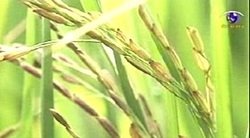This year is the fourth anniversary since Thailand designated today, June 5, as National Rice and Farmers Day. As Thailand has been the world’s top rice exporter for a long time, questions about the future of Thai farmers and their improved livelihood remain unanswered.
From the onset of the rainy season, farmers started ploughing to prepare the soil for seasonal rice planting in hope for a good price for their produce, which is now guaranteed by the government under the rice mortgage scheme, beginning last year.

Despite some problems in implementing the plan, farmers are generally satisfied with the government’s project.
“Taking into account higher rice prices in the market, and farmer satisfaction, I believe the government’s rice mortgage scheme must be considered successful,” said Yanyong Puangrach, Permanent Secretary for Commerce.
Losses that might be incurred by the government is not the point, as the government aims to raise rice prices to increase farm income,” Mr Yanyong added.
The government is confident that Thailand will be able to retain the status quo as the world’s top rice exporter.
In the first four months of this year, Thailand ranked first, exporting the largest volume of 2.7 million tonnes of rice. It is believed that each year, there is demand for at least seven million tonnes of Thai rice, so the country’s target to export 8.5-9 million tonnes is possible.
“Farmers are satisfied—to a certain extent— but it must be admitted that some problems remain, such as delays in issuing warrant documents in many areas,” said Prasit Boonchueay, chairman of the Thai Rice Farmers Association.
“If the government cannot sell mortgaged rice, it won’t have money to buy rice in the next round. Then, farmers have to sell their rice produce to rice mills at low prices,” he said.
However, it needs more time to prove whether the rice mortgage policy will be accomplished.
Under the rice mortgage scheme, management of rice reserves in stockpiles is a difficult task as the government must strike a balance between releasing rice in stock and preventing a drop in global rice prices and at the same time, it must oversee rice prices in the domestic market to prevent a rise that could hurt Thai consumers.
Although the National Rice and Farmers Day was designated to highlight the importance of farmers, the so-called backbone of the nation, the future of Thai farmers remains uncertain.
According to a survey by the Thai Rice Foundation, the number of farmers continues to drop. And 90 per cent of farmer’s children—the future of Thai agriculture—said they would not carry on their forebear’s work in rice paddies.
Another threat to the future of agricultural occupations is the issue of land. Rice paddies have changed into residential estates, commercial buildings, and industrial factories. Many remaining rice paddies belong to business investors and farmers become renters and workers on rice farms that used to be their own.
Since the long ago past until now, Thai governments have always had policies to increase farmers’ income and improve their quality of living but to achieve the goal, more needs to be done seriously besides price guarantee and rice mortgage schemes and designation of the National Rice and Farmers Day.




